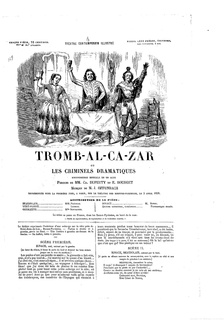Armand-Numa Jautard was a 19th-century French playwright and chansonnier who died after 1872 [1]
A playwright or dramatist is a person who writes plays.
A chansonnier was a poet songwriter, solitary singer, who sang his or her own songs (chansons) with a guitar, prominent in francophone countries during the 1960s and 1970s. Compared to the popular singer, the chansonnier needs no artifice to sing his/her soul poetry. They performed in «Les Boites à Chansons». which were flourishing in those years. The themes of their songs varied but included nature, love, simplicity, and a social interest to improve their world.
Contents
His plays were performed on the most important Parisian stages of the 19th century: Théâtre des Folies-Dramatiques, Théâtre de l'Odéon, Théâtre du Palais-Royal, Théâtre des Variétés etc.

A play is a form of literature written by a playwright, usually consisting of dialogue or singing between characters, intended for theatrical performance rather than just reading. Plays are performed at a variety of levels, from Broadway, Off-Broadway, regional theater, to Community theatre, as well as university or school productions. There are rare dramatists, notably George Bernard Shaw, who have had little preference as to whether their plays were performed or read. The term "play" can refer to both the written texts of playwrights and to their complete theatrical performance.

The Théâtre des Folies-Dramatiques was a theatre in Paris in the 19th and 20th centuries. Opened first in 1832 in the site of the old Théâtre de l'Ambigu-Comique on the Boulevard du Temple, under Frédérick Lemaître it became a noted venue for the genre of mélodrame.

The Théâtre du Palais-Royal is a 750-seat Parisian theatre at 38 rue de Montpensier, located at the northwest corner of the Palais-Royal in the Galerie de Montpensier at its intersection with the Galerie de Beaujolais.




